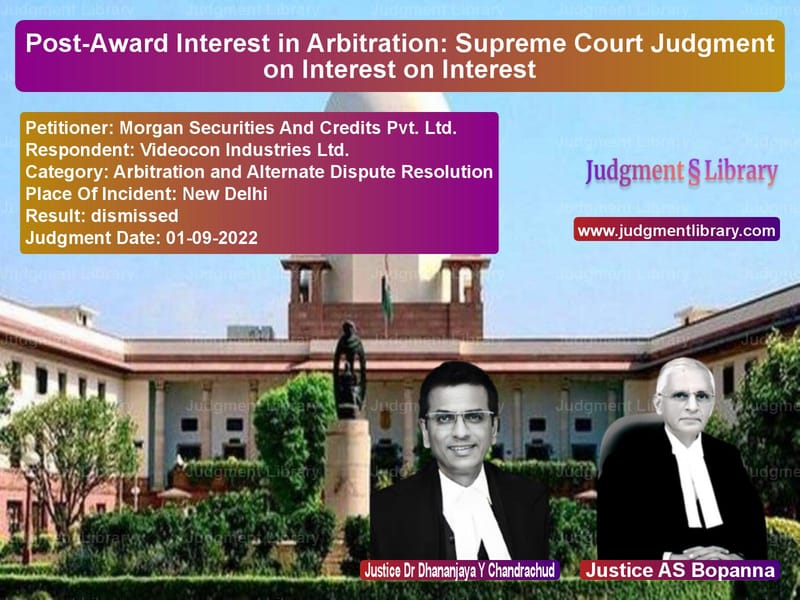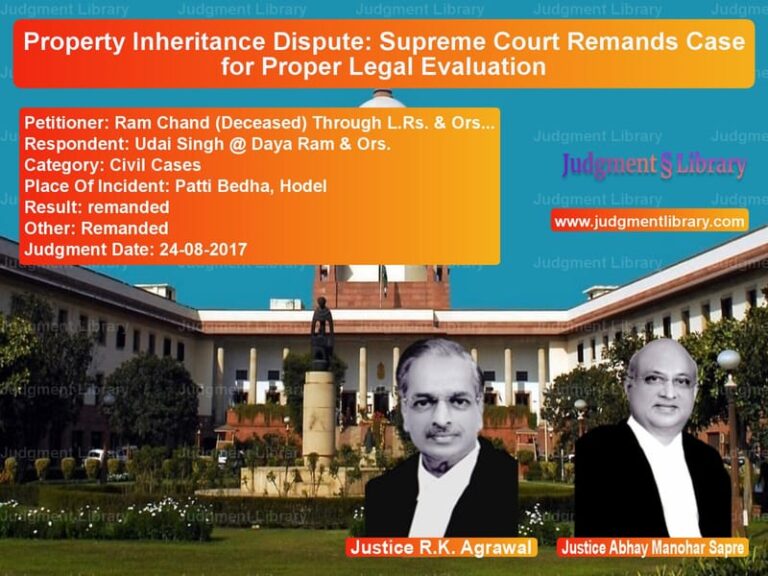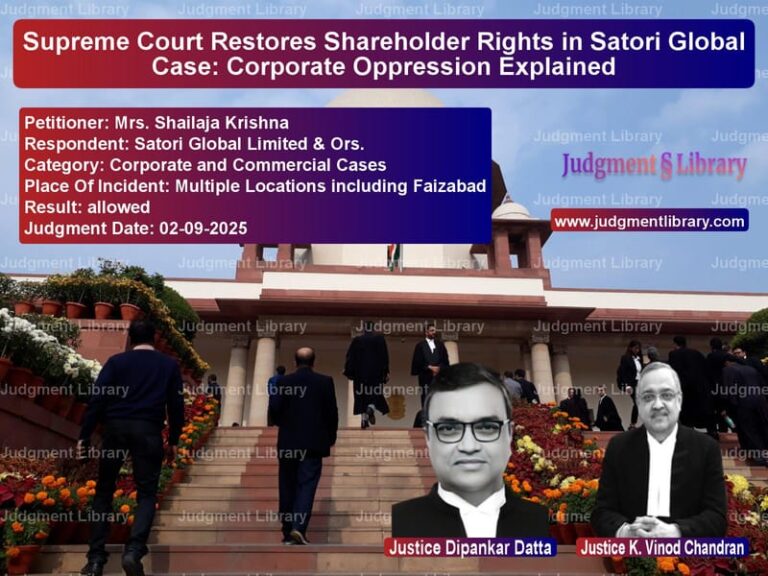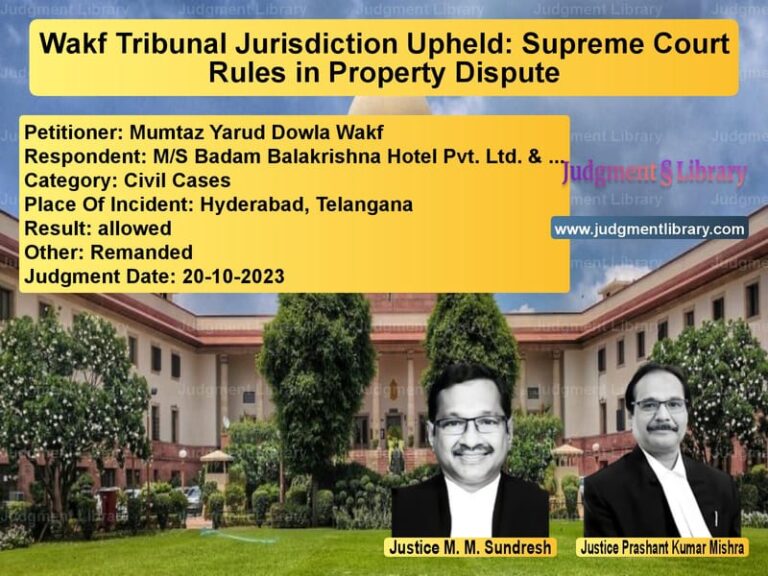Post-Award Interest in Arbitration: Supreme Court Judgment on Interest on Interest
The Supreme Court of India recently delivered a judgment in the case of Morgan Securities and Credits Pvt. Ltd. v. Videocon Industries Ltd., which deals with the issue of post-award interest in arbitration proceedings. The case primarily addresses whether an arbitral tribunal can grant post-award interest on both the principal and pre-award interest, or if it is limited to the principal amount alone. The appellant, Morgan Securities, challenged the decision of the Delhi High Court which had upheld the arbitral tribunal’s award of post-award interest only on the principal sum and not on the pre-award interest.
The issue arose from a dispute between the appellant and the respondent, Videocon Industries Ltd., related to the non-payment of a debt. The arbitration tribunal had awarded the appellant a sum of Rs. 5,00,32,656, along with interest at various rates for different periods, including pre-award interest and post-award interest at 18% per annum. The appellant contended that the post-award interest should be calculated on the total sum, including both the principal and the pre-award interest, while the respondent argued that the post-award interest should only apply to the principal sum, as stipulated by the tribunal.
Background of the Dispute
The appellant and the respondent entered into an agreement in 2003, under which the respondent availed itself of bill discounting facilities from the appellant. The appellant disbursed a sum of Rs. 5,00,32,656 to the respondent, but the dues remained unpaid. In response to the non-payment, the appellant issued a demand notice in January 2006, claiming the principal amount along with overdue interest. When the respondent failed to pay, the appellant invoked the arbitration clause of the agreement.
The arbitration tribunal, after considering the dispute, ruled in favor of the appellant, granting the claimed amount along with interest. The interest award was divided into two parts: (i) 21% per annum on the principal sum up to the date of the demand notice, (ii) 36% per annum with monthly rests from the date of the demand notice to the date of the award (pre-award interest), and (iii) 18% per annum on the principal sum from the date of the award to the date of payment (post-award interest). The award, however, limited post-award interest to the principal amount alone.
Unhappy with the limitation on post-award interest, the appellant filed an objection under Section 34 of the Arbitration and Conciliation Act, 1996, seeking to amend the award and have the post-award interest applied to both the principal and pre-award interest. The objection was dismissed by the Delhi High Court, which upheld the tribunal’s award. The appellant then filed an appeal before the Supreme Court.
Petitioner’s Arguments
The appellant, Morgan Securities, presented several arguments before the Supreme Court. The primary contention was that the post-award interest should be calculated on the total sum of Rs. 5,00,32,656, which included both the principal and pre-award interest. The appellant’s counsel argued that, according to the provisions of Section 31(7) of the Arbitration and Conciliation Act, 1996, once pre-award interest is awarded, it should be considered part of the ‘sum’ on which post-award interest is payable.
The appellant’s counsel also referred to the judgment in *Hyder Consulting (UK) Ltd. v. State of Orissa* (2015), where it was held that post-award interest should apply to the aggregate of the principal sum and pre-award interest. The appellant argued that, in the present case, the arbitral tribunal’s discretion to award post-award interest should extend to the entire sum, not just the principal.
Read also: https://judgmentlibrary.com/supreme-court-orders-arbitration-in-sikkim-hotel-lease-dispute/
Furthermore, the appellant’s counsel contended that the arbitration tribunal’s award of post-award interest only on the principal was erroneous, as the pre-award interest had already formed part of the award and should logically be included in the sum on which post-award interest was calculated. The appellant argued that the tribunal’s failure to do so led to an incomplete award and that the Court should intervene to ensure the proper calculation of post-award interest.
Respondent’s Arguments
The respondent, Videocon Industries Ltd., argued that the arbitration tribunal had correctly applied the law by awarding post-award interest only on the principal sum. The respondent’s counsel contended that Section 31(7)(b) of the Arbitration and Conciliation Act clearly provided for post-award interest on the ‘sum’ directed to be paid by the award, and that the tribunal had exercised its discretion in line with legal precedents by restricting post-award interest to the principal amount.
The respondent’s counsel also referred to the judgment in *State of Haryana v. S.L. Arora* (2010), where it was held that the arbitrator has the discretion to award post-award interest, but only on the principal sum, unless the award specifies otherwise. The respondent argued that the tribunal had made a well-reasoned decision in limiting post-award interest to the principal, and that the appellant’s request to include pre-award interest in the post-award interest calculation was unwarranted and contrary to the established legal framework.
The respondent further argued that the provisions of Section 31(7)(b) only applied when the arbitral award was silent on the issue of post-award interest. Since the tribunal had explicitly directed post-award interest on the principal, there was no need for the Court to intervene and modify the award.
Court’s Reasoning
The Supreme Court carefully examined the provisions of Section 31(7) of the Arbitration and Conciliation Act, 1996, which governs the award of pre-award and post-award interest. The Court noted that Section 31(7)(a) deals with pre-award interest, and Section 31(7)(b) addresses post-award interest. The Court acknowledged that post-award interest was meant to compensate the award holder for the delay in receiving payment after the award was made.
The Court also examined the previous judgments cited by both parties, including *Hyder Consulting* and *S.L. Arora*, to understand the extent of discretion available to arbitral tribunals in awarding post-award interest. The Court noted that while the arbitrator has discretion over the rate of post-award interest, the issue of whether post-award interest should be applied to both the principal and pre-award interest had not been conclusively addressed in previous cases.
After reviewing the provisions of the Arbitration and Conciliation Act and the relevant case law, the Court concluded that the arbitrator does indeed have the discretion to grant post-award interest on the aggregate sum of the principal and pre-award interest. The Court emphasized that when pre-award interest has been awarded, it should be included in the sum for calculating post-award interest, as the two components (principal and interest) become part of the total amount due.
Judgment
The Supreme Court allowed the appeal and set aside the Delhi High Court’s judgment, which had upheld the arbitral tribunal’s award of post-award interest only on the principal sum. The Court directed that the post-award interest should be calculated on the total sum, including both the principal and pre-award interest, in accordance with Section 31(7) of the Arbitration and Conciliation Act.
The Court also emphasized that the arbitral tribunal should exercise its discretion reasonably and in accordance with the principles of fairness, ensuring that the award is comprehensive and compensates the award holder for the full amount due. The Court’s decision clarified that the aggregate sum, once pre-award interest is included, should be treated as a single sum for the purposes of calculating post-award interest.
Conclusion
This case clarifies the application of post-award interest in arbitration proceedings, particularly regarding the inclusion of pre-award interest in the sum on which post-award interest is calculated. The Supreme Court’s judgment reinforces the principle that arbitral tribunals have the discretion to grant post-award interest on the total sum, including both principal and pre-award interest, to ensure fairness in the award of interest. The ruling also provides valuable guidance on the interpretation of Section 31(7) of the Arbitration and Conciliation Act, ensuring that parties receive full compensation for the delay in payment after the award.
Petitioner Name: Morgan Securities And Credits Pvt. Ltd..Respondent Name: Videocon Industries Ltd..Judgment By: Justice Dr Dhananjaya Y Chandrachud, Justice AS Bopanna.Place Of Incident: New Delhi.Judgment Date: 01-09-2022.
Don’t miss out on the full details! Download the complete judgment in PDF format below and gain valuable insights instantly!
Download Judgment: morgan-securities-an-vs-videocon-industries-supreme-court-of-india-judgment-dated-01-09-2022.pdf
Directly Download Judgment: Directly download this Judgment
See all petitions in Arbitration Act
See all petitions in Arbitration Awards
See all petitions in Mediation Cases
See all petitions in Dispute Resolution Mechanisms
See all petitions in Commercial Arbitration
See all petitions in Judgment by Dhananjaya Y Chandrachud
See all petitions in Judgment by A. S. Bopanna
See all petitions in dismissed
See all petitions in supreme court of India judgments September 2022
See all petitions in 2022 judgments
See all posts in Arbitration and Alternate Dispute Resolution Category
See all allowed petitions in Arbitration and Alternate Dispute Resolution Category
See all Dismissed petitions in Arbitration and Alternate Dispute Resolution Category
See all partially allowed petitions in Arbitration and Alternate Dispute Resolution Category







